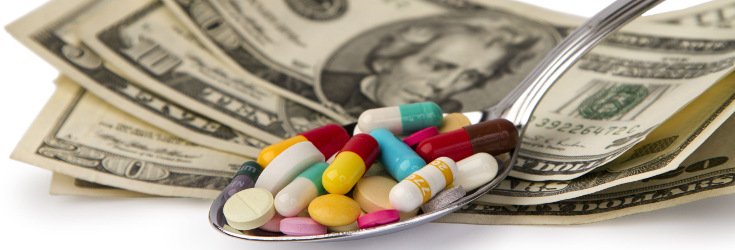Study: 70% of People on Antidepressants Don’t Have Depression

If sales for antidepressants such as Zoloft, Lexapro, or Prozac tell us anything, it’s that depression is sweeping the nation. But a new study questions the validity of most of these sales. The study has found that the majority of individuals on antidepressants – a whopping 69% – do not even meet the criteria for clinical depression. These individuals are likely just experiencing normal sadness and hardships that most of us experience.
In addition to finding that nearly two-thirds of antidepressant-takers don’t meet criteria for depression, the researchers also note how 38% of those taking antidepressants for other psychiatric disorders do not meet the criteria. These include panic disorder, obsessive compulsive disorder, social phobio, general anxiety, and a number of other arguably fabricated mental disorders.
The study, published in The Journal of Clinical Psychiatry, reads:
“Objective: Past studies have shown that many individuals who use antidepressants have no current or lifetime history of mental disorders. However, recent studies suggest that the one-time retrospective evaluation of mental disorders commonly used in such studies may substantially underestimate the true lifetime prevalence of mental disorders. We examined the prevalence of mental disorders, assessed prospectively over multiple interviews, among individuals currently using antidepressants in a community sample.
…Conclusions: Many individuals who are prescribed and use antidepressant medications may not have met criteria for mental disorders. Our data indicate that antidepressants are commonly used in the absence of clear evidence-based indications.”
Prescriptions for anti-depressants have skyrocketed over the past several decades. In 1998, 11.2 million Americans used these drugs. By 2010, it was 23.3 million.
A few years back, Harvard conducted a study to reiterate what many in the psych professionals already know – Americans are addicted to anti-depression meds. We collectively pop Prozac, Celexa, Effexor, Paxil, and Zoloft pills like they are candy in an attempt to boost mood and feel better. The increase in sales of anti-depressants is up a startling 400%. This pill-popping became the norm, even though clinical studies suggest there are numerous natural remedies that can help us feel better, without the pricey and life altering side-effects that many of these drugs can cause.
Read: 5 Ways to Boost Happiness Naturally
Unfortunately, we are fighting a partnership between the psychiatric community and doctors that exists in the background. An astonishing 70 percent of the panel members of psychiatric bible, known as the Diagnostic and Statistical Manual of Mental Disorders, reported having financial relationships with pharmaceutical companies. About 57 percent reported ties in the previous edition. This is just one reason pharmaceuticals are sweeping the nation.
Thankfully, the natural health movement will likely bring our pill-popping addiction down a peg as natural alternatives are sought after in order to avoid fueling the drug companies and their side-effect-riddled drugs. After all, natural solutions do exist.

I believe this study is true. I moved to a new city and found a new doctor and she asked me how I was feeling and I told her how I’m a bit sad and homesick and she asked me if I’d like to try some antidepressants that will help. I of course said no but surprised how easily she was about to prescribe them and I already knew how useless and dangerous antidepressants are. I think temporarily prescribing a marijuana joint or a glass or two of wine before bedtime would be helpful though.
Well, if you read the article you are citing as a study conducted by Harvard was not conducted by Harvard at all… it was conducted by the National Center for Health Statistics, aka a branch of the CDC. It would have been more prudent to discuss one of the more current studies that has been conducted regarding the use of antidepressants, rather than a statistical analysis done on data that was pulled around 10 years ago (the analysis was done on data from 2005-2008). One of the most interesting pieces of information about this topic, in my opinion, was JUST published in March…
I’m confused about the last part—how exactly is it going to help me look for natural alternatives to my medication if I shop for clothing? And I was medicated for BPD, panic attacks and PTSD in 1998, so I’m sure I would have been counted among both the 11.2 million in 1998 and the 23.3 million in 2010–regardless. Illogical, allegorical and stupid.
Honestly, there were far too many factual and methodological errors for me to take this article seriously. As has already been noted, your research is outdated, you cite studies incorrectly, and are obviously doing so in an attempt to sway the reader’s opinion towards your opinion: the use of anti-depressants is unneccesary. While I can tolerate your apparent lack of understanding regarding simple research methods; what I find intolerable is your ridiculous contention that GAD, OCD, Social Anxiety, and Depression are fabricated. If only you were correct, there would be far fewer suicides.
I’ve been reading about this and it’s pretty frightening. Mel at clearpanicaway
Claiming that OCD is fabricated? F you. I have a subtype of OCD called HOARDING, If you ever get cancer, I hope doctors accuse you of fabricating it and then pull the plug.